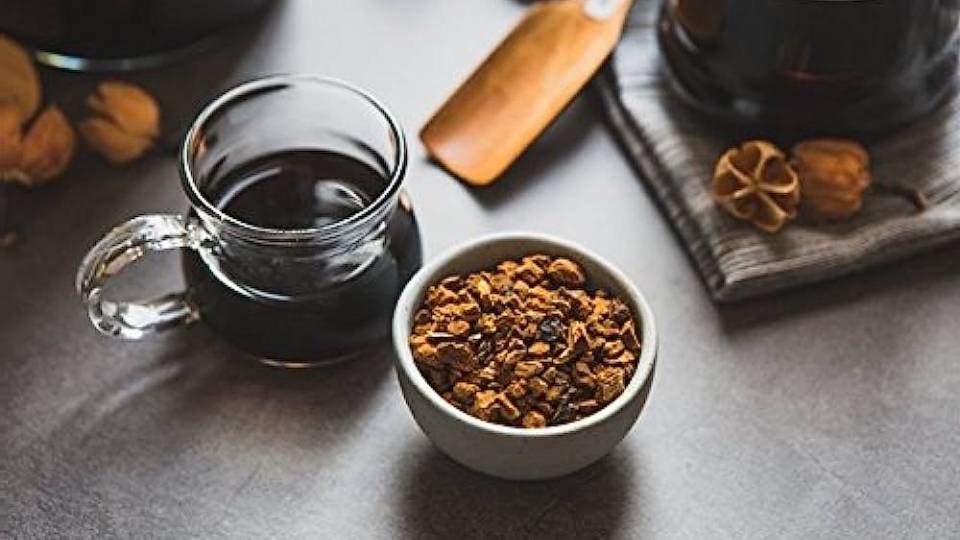Boost Your Health with Homemade Chaga Tea Recipes
Enhance your immunity and promote overall well-being by incorporating the powerful chaga tea into your routine. Learn the chaga tea recipe and discover why it’s a fantastic choice. This beloved beverage, derived from chaga mushrooms, has been enjoyed for centuries for its abundant vitamins, minerals, antioxidants, and phytonutrients. Making chaga tea at home is a breeze, allowing you to customize it to your taste preferences with various brewing methods.
So, in this article, we’ll guide you through the process, share a simple recipe, and explore the benefits and potential side effects of this delightful tea. Whether you’re an avid tea lover or seeking a new experience, chaga tea is a wonderful addition to your daily routine.
In this article:
What is Chaga Tea?
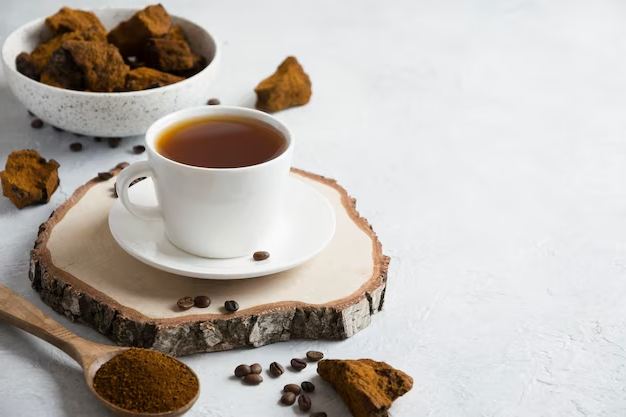
Chaga mushrooms, also known as Inonotus obliquus, grow on birch trees in cold climates like Siberia, Alaska, and northern Canada. When you make Chaga tea, it’s believed to have many health benefits that can enhance your well-being.
Chaga tea is famous for its rich antioxidants, which can shield your body from harmful free radicals and oxidative stress. It also possesses potential anti-inflammatory properties that may help improve your overall health. Moreover, Chaga tea has been linked to various advantages, such as supporting your immune system and potentially fighting against cancer[1].
So, when you enjoy a cup of Chaga tea, you’re not only savoring a delicious beverage but also nourishing your body with its incredible health-boosting properties.
Chaga Tea Health Benefits
Chaga mushrooms offer potential health benefits.
- Reduce inflammation: Chaga’s antioxidants combat body inflammation, including in the gut[2].
- Fight cancer: Studies suggest chaga slows cancer cell growth due to its antioxidants[3].
- Lower blood sugar: Chaga may decrease blood sugar levels and improve insulin resistance, though more research is needed[4].
- Lower cholesterol: Chaga helps lower “bad” cholesterol, reducing heart disease risk.
- Boost immune system: Chaga’s beta-glucans enhance immunity and combat infections.
- Regulate gut microbiota: Chaga supports gut health and maintains a balanced gut microbiota.
- Slow signs of aging: Chaga’s beta-glucans and betulinic acid delay skin aging, soothing irritations and reducing redness.
Chaga Nutrition Facts
Here’s a table outlining the nutrition facts of Chaga mushrooms:
| Nutrient | Amount per 100g |
|---|---|
| Calories | 26 |
| Carbohydrates | 3g |
| Fiber | 1.4g |
| Protein | 2g |
| Fat | 0.4g |
| Vitamin B2 (Riboflavin) | 0.11mg |
| Vitamin D | 0.1µg |
| Potassium | 520mg |
| Copper | 0.05mg |
| Manganese | 5.4mg |
| Zinc | 0.3mg |
Please note that the values provided are approximate and can vary based on the source and preparation of Chaga mushrooms.
Other Uses of Chaga
Apart from Chaga tea, there are various other recipes that allow you to incorporate Chaga into your diet and experience its unique flavor and potential health benefits.
- Chaga Coffee: Blend Chaga extract powder with your favorite coffee for a nutritious and flavorful twist. This coffee alternative provides an energy boost along with the potential benefits of Chaga.
- Chaga Broth: Create a hearty Chaga mushroom broth by simmering Chaga chunks in vegetable or bone broth. This savory concoction can be enjoyed as a standalone drink or used as a base for soups and stews.
- Chaga Tincture: Prepare a Chaga tincture by steeping Chaga chunks in a mixture of alcohol and water. This concentrated extract can be added to beverages or used in various culinary preparations.
Harvesting and Sustainability
It’s essential to consider the sustainability of Chaga harvesting. Chaga mushrooms take years to mature on birch trees, and over-harvesting can deplete their population and disrupt the ecosystem. Responsible harvesting practices involve taking only a portion of Chaga from each tree and leaving some behind to ensure regrowth.
If you’re unable to source Chaga sustainably or prefer an alternative, there are other medicinal mushrooms available with similar health benefits, such as Reishi, Lion’s Mane, and Cordyceps. These mushrooms can be found in supplement form or used in teas and recipes.
Side Effects and Precautions
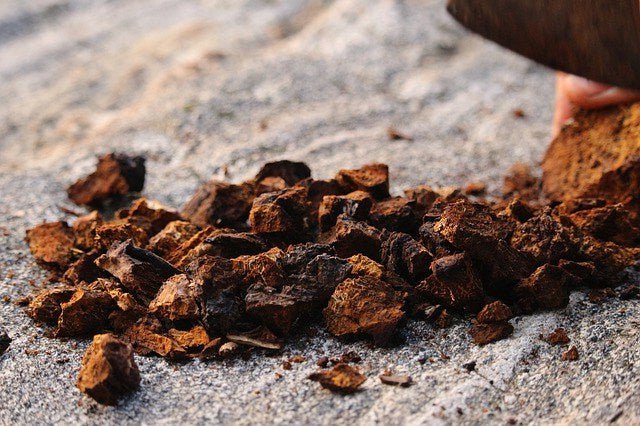
When considering the use of chaga mushrooms for their potential benefits, it’s essential to be mindful of the possible side effects and precautions[5]. Here are some important points to keep in mind:
Precautions
- Be cautious with chaga if you have an autoimmune disease, as it may stimulate the immune system and worsen symptoms.
- If you have a bleeding disorder, it’s advisable to avoid chaga due to its potential to increase the risk of bleeding.
- Chaga can interact with certain medications, so it’s crucial to consult your healthcare provider before using chaga supplements.
- Since the safety and appropriate dosage of chaga have not been established through human studies, it’s important to exercise caution.
Side Effects
- Although generally well-tolerated, some individuals may experience side effects from chaga mushrooms.
- People taking insulin or other blood-sugar-lowering medications should be cautious with chaga, as it may lower blood sugar levels excessively.
- Chaga extract may interfere with the function of anticoagulants and antiplatelet drugs, affecting their effectiveness.
- Chaga mushrooms contain oxalates, which in high doses can hinder the absorption of certain nutrients and potentially be toxic.
- There has been a case report of kidney damage/disease associated with daily chaga consumption over six months.
NOTE
Remember, while chaga mushrooms offer potential benefits, it’s crucial to consult your healthcare provider before considering their use, especially if you have a bleeding disorder, autoimmune disease, or are taking any medications. Your healthcare provider can provide personalized advice and guidance based on your specific circumstances.
Chaga Tea Recipes
For the Chaga tea recipe, you’ll need a few basic ingredients, with the primary one being Chaga itself. Chaga is available in two forms: Chaga chunks and Chaga extract powder. Depending on your preference and what’s accessible to you, you can select the method that works best for making your Chaga tea.
Making Chaga Tea with Chaga Chunks
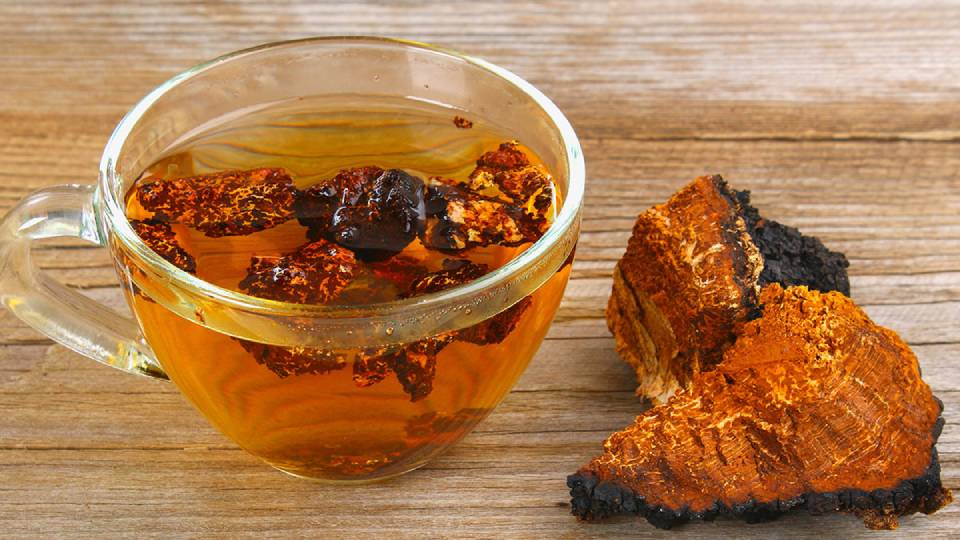
Ingredients
Instructions
- Break the Chaga chunks into smaller pieces using a coffee grinder or a sharp knife.
- Boil the water in a saucepan.
- Add the Chaga chunks to the boiling water and reduce the heat to a simmer.
- Allow the Chaga chunks to steep in the water for at least 30 minutes. For a stronger brew, you can simmer for up to 2 hours.
- Remove the saucepan from heat and strain the tea using a fine-mesh sieve or a tea ball.
- Serve the Chaga tea hot and enjoy its earthy flavor and potential health benefits.
Chaga Tea with Chaga Extract Powder
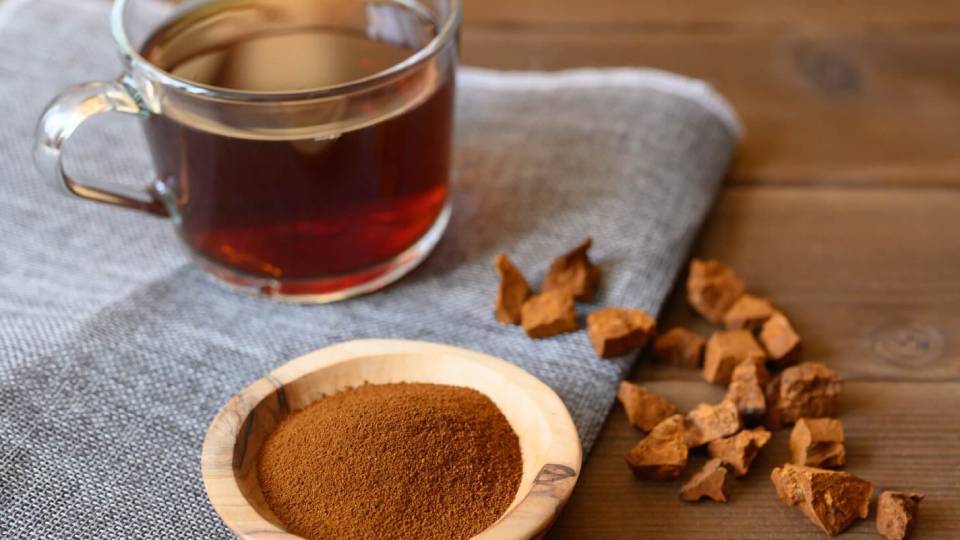
Ingredients
Instructions
- Heat 2-3 cups of water to approximately 176 degrees Fahrenheit.
- Add one tablespoon of Chaga (or an equivalent or slightly greater amount of chaga chunks).
- With the tablespoon of Chaga in the pot, simmer for a minimum of 45 minutes while stirring occasionally. Longer steeping times will result in a richer tea. Do not boil water!
- Pour into a cup (filtering grounds is optional – most sink to the bottom).
- Optional – add honey for some sweetness!
Chaga Chai Tea Recipe

Ingredients
Instructions
- In a large pot, bring the water to a boil.
- Reduce the heat to low and simmer for 1-2 hours.
- Remove from heat and stir in the vanilla extract and coconut milk.
- Strain the tea and serve hot.
Suka’s Chaga Tea Recipes

Ingredients
Instructions
- Add the chaga, cinnamon sticks, cardamom pods, and ginger (if using) to a pot filled with 2 liters of water.
- Bring the pot to a boil, then reduce the heat and simmer for 2-4 hours.
- Strain the tea and serve hot. Add honey or maple syrup to taste.
FAQs
Are There Any Side Effects of Consuming Chaga Tea?
Chaga tea is generally safe, but excessive consumption may lead to digestive discomfort. People with mushroom allergies, those taking immunosuppressive medications, or pregnant/breastfeeding individuals should avoid it. Consult a healthcare provider for personalized advice and to monitor for any potential side effects.
Can Chaga Tea Help Lower Blood Sugar Levels?
Some studies suggest Chaga tea may help lower blood sugar levels, but more research is needed for conclusive evidence. If you have diabetes or are concerned about blood sugar levels, consult a healthcare provider and use Chaga as a complementary measure, not a substitute for medical treatment.
Can I Use a French Press to Brew Chaga Tea?
Yes, you can use a French press to brew Chaga tea. Simply place Chaga chunks or powder in the French press, add hot water, and steep for your desired time. Press the plunger down to separate the Chaga from the liquid. Adjust the Chaga-to-water ratio and steeping time to taste preference.
Is Chaga Tea Suitable For Vegans?
Yes, Chaga tea is suitable for vegans. It’s made from the Chaga mushroom, which is a plant-based source, and typically contains no animal-derived ingredients. However, it’s important to check product labels to ensure there are no added non-vegan ingredients if you have specific dietary preferences or restrictions.
How Does Chaga Tea Support The Immune System?
Chaga tea supports the immune system through its high antioxidant content, which helps combat free radicals and reduce oxidative stress. This can enhance overall immune function and potentially improve the body’s ability to fight off illnesses and infections, contributing to better immune health.
Conclusion
In summary, Chaga tea is a remarkable herbal beverage with a rich history and potential health benefits. This tea, derived from the Chaga mushroom, offers antioxidants and potential anti-inflammatory properties that may contribute to overall well-being. By following the provided recipes, you can easily prepare Chaga tea using Chaga chunks or Chaga extract powder. Additionally, there are other exciting Chaga recipes like Chaga coffee and Chaga broth that allow you to explore different flavors and incorporate Chaga into your diet. Embrace the potential health benefits and enjoy the delightful flavors of Chaga tea and other Chaga-infused creations.
References
1. Inonotus obliquus Polysaccharide Ameliorates Azoxymethane/Dextran Sulfate Sodium-Induced Colitis-Associated Cancer in Mice via Activation of the NLRP3 Inflammasome. Retrieved from ncbi.nlm.nih.gov/pmc/articles/PMC7884887/
2. In vivo and in vitro anti-inflammatory and anti-nociceptive effects of the methanol extract of Inonotus obliquus. Retrieved from https://www.researchgate.net/search/publication?q=Inonotus+obliquus+anti-inflammatory
3. Biological and anticancer properties of Inonotus obliquus extracts. retrieved from https://www.sciencedirect.com/science/article/abs/pii/S1359511318304537
4. Research of Inonotus obliquus Oligosaccharide in Prevention of Hyperlipidemia. Retrieved from https://www.researchgate.net/publication/356655543_Research_of_Inonotus_obliquus_Oligosaccharide_in_Prevention_of_Hyperlipidemia
5. Phytochemistry, traditional uses and health benefits of the mushroom inonotus obliquus (Chaga). Retrieved from https://www.researchgate.net/publication/292243402_Phytochemistry_traditional_uses_and_health_benefits_of_the_mushroom_inonotus_obliquus_Chaga

